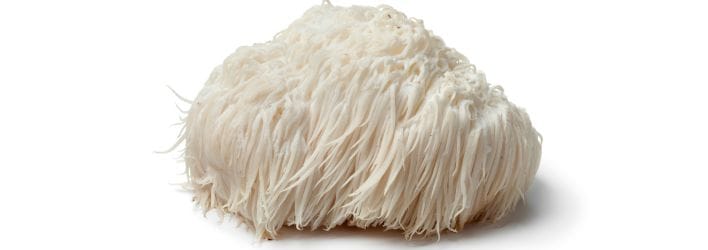Lion's Mane, a medicinal mushroom scientifically known as Hericium erinaceus
Lion's Mane has been gaining popularity for its potential health benefits, particularly in the realm of cognitive function and mental health. As more people seek natural ways to support their well-being, a common question arises: can you drink Lion's Mane every day? This article delves into the safety, benefits, and considerations of daily consumption of Lion's Mane.

What is Lion's Mane Mushroom?
Lion's Mane is a unique, shaggy mushroom that resembles a lion's mane as it grows. It has been used for centuries in traditional Chinese medicine and is now widely available in health food stores and online. Lion's Mane supplements come in various forms, including lion's mane powder, lion's mane extract, lion's mane added to coffee, and even fresh Lion's Mane mushrooms.
The Research Behind Lion's Mane
Biomedical research has shown that Lion's Mane contains bioactive components isolated from its fruiting body and mycelium that can stimulate the production of nerve growth factor (NGF). NGF is crucial for the growth and survival of nerve cells, which is why Lion's Mane may be beneficial for brain health and cognitive function.
Daily Consumption of Lion's Mane
When it comes to incorporating Lion's Mane into your daily routine, you have several options. You can find Lion's Mane mushroom powder that can be mixed into drinks, supplement form capsules, or even fresh Lion's Mane carries that can be cooked and eaten. The versatility of Lion's Mane makes it an easy addition to any diet.
Benefits of Lion's Mane for Brain Health
Research suggests that Lion's Mane may have a positive impact on brain health. Studies have found that Lion's Mane supplements can improve cognitive test scores in older adults with mild cognitive impairment. This could be linked to the mushroom's ability to promote the growth and repair of brain cells.
Lion's Mane and Mental Health
Mental health is another area where Lion's Mane appears to show promise. Some studies suggest that taking Lion's Mane can help alleviate symptoms of anxiety and depression. The potential for Lion's Mane to support mental health makes it a subject of interest for further research.
Lion's Mane for the Intestinal Immune System
Beyond brain and mental health, Lion's Mane may also benefit the intestinal immune system. The mushroom contains compounds that can help maintain a healthy gut, which is crucial for overall immune function.
How Much Lion's Mane Should You Take?
Determining the right lion's mane dosage is important. While there is no one-size-fits-all answer, most studies use a range of 250 to 1000 mg per day. It's best to start with a lower dose and increase gradually as needed.
Potential Health Benefits of Lion's Mane
The potential health benefits of Lion's Mane are vast. From brain injury recovery to heart health, the mushroom has been associated with a variety of positive health outcomes. It's also been found to lower blood sugar levels, which could be beneficial for those with diabetes.
Lion's Mane and Heart Disease
Heart disease is a leading cause of death worldwide, and Lion's Mane may offer some protective benefits. Animal studies have shown that Lion's Mane can reduce the risk factors associated with heart disease, such as high cholesterol and obesity.
Lion's Mane in Traditional Medicine
In Asian countries, Lion's Mane has been used in traditional medicine for its healing properties. Known as the mushroom yamabushitake, it's been consumed for its potential to improve vitality and cognitive health.
Lion's Mane and Diabetes Management
Have you ever wondered if medicinal mushrooms like Lion's Mane could play a role in managing diabetes? Well, recent peer-reviewed studies have started to shed light on this fascinating possibility. It turns out that Lion's Mane may have potential benefits for those managing their blood sugar levels. Some research, published in journals like Phytotherapy Research, suggests that Lion's Mane extract can influence blood glucose regulation, which is crucial for individuals diagnosed with diabetes. This is particularly interesting for certified diabetes care and education specialists who are always on the lookout for natural adjunct therapies.
Moreover, the health benefits of Lion's Mane don't just stop at brain health; they extend to metabolic health as well. In animal studies, Lion's Mane mushroom powder has been found to reduce body weight and improve insulin sensitivity, which are both key factors in diabetes management. While more human studies are needed to confirm these effects, the current evidence is promising. For those considering taking Lion's Mane for diabetes, it's important to consult with a healthcare provider to determine the appropriate Lion's Mane dosage and ensure it fits into their overall diabetes care plan.
Lion's Mane and Antioxidant Properties
Have you ever wondered if lion's mane medicinal mushroom is a good source of antioxidants? Well, it turns out that this fascinating fungus is not just a culinary delight but also a powerhouse of health-promoting properties. Studies have found that lion's mane extract contains potent antioxidants that help combat oxidative stress in the body. This is crucial because oxidative stress is implicated in the aging process and various diseases. By incorporating lion's mane powder or supplements into your daily routine, you could be giving your body an extra shield against these harmful processes.
Moreover, the benefits of lion's mane extend beyond its antioxidant capacity. The mushroom's ability to stimulate the production of the bioprotein nerve growth factor (NGF) and myelin, both of which are vital for brain health, is particularly noteworthy. This suggests that lion's mane may be beneficial in protecting against cognitive disorders associated with oxidative stress, such as mild Alzheimer's disease. So, next time you're considering taking lion's mane, remember that you're not just supporting your brain health but also fortifying your body's defense against oxidative damage.
Lion's Mane and Neurogenesis
Have you ever wondered if eating lion's mane could actually lead to the birth of new neurons? This process, known as neurogenesis, is crucial for maintaining brain plasticity and overall cognitive function. Studies have found that lion's mane contains two special compounds, hericenones and erinacines, which stimulate the growth of brain cells. This is particularly exciting because it suggests that lion's mane may have the potential to repair and regenerate brain tissue, which could be a game-changer for conditions related to cognitive decline.
Moreover, lion's mane medicinal mushroom isn't just a fleeting trend in the wellness community; it's backed by science. Peer-reviewed studies have shown that these neurogenic properties are not just theoretical. For instance, in a study involving mice, lion's mane extract significantly increased the number of neuronal progenitor cells. This is promising news for humans, especially for those at risk of neurological diseases or those recovering from brain injuries. The implications for health benefits of lion's mane in neurogenesis are vast and warrant further exploration.

Lion's Mane and Cognitive Enhancement
Have you ever wondered if lion's mane medicinal mushroom could be the brainpower booster you've been looking for? Well, studies are increasingly suggesting that lion's mane may indeed support cognitive enhancement. This fascinating fungus contains compounds that stimulate the growth of brain cells and could potentially improve memory and concentration. Imagine sipping on a cup of lion's mane tea and feeling your mental fog lift, giving way to clearer thoughts and sharper focus. It's not just a scene from a sci-fi novel; it's a possibility grounded in emerging science.
The beauty of lion's mane extract lies in its versatility. Whether you're a student cramming for exams, an education specialist looking to maintain mental acuity, or even someone concerned about mild Alzheimer's disease, incorporating this mushroom into your daily routine could be beneficial. Powdered lion's mane can be easily added to smoothies, coffee, or even baked goods (who wouldn't love to ate cookies that boost brain function?). As research progresses, we're finding more and more reasons to consider lion's mane mushroom powder as a staple in the diet of anyone seeking cognitive enhancement.
Lion's Mane and Recovery from Nervous System Injuries
The nervous system is incredibly complex, and recovering from injuries to it, such as those to the spinal cord, can be a daunting challenge. However, lion's mane appears to have properties that support the repair and growth of nerve cells. This is groundbreaking because it opens up the possibility of using lion's mane supplements as a complementary treatment for individuals recovering from nervous system injuries. The compounds in lion's mane have been shown in peer-reviewed studies to stimulate the production of Nerve Growth Factor (NGF), which is crucial for the maintenance and growth of neurons.
What's even more exciting is that you don't have to wait for an injury to start reaping the health benefits of lion's mane. Regular consumption of fresh lion's mane mushrooms or supplements could potentially act as a preventive measure, safeguarding your nervous system's health. Whether you're an athlete looking to protect your body from the wear and tear of intense physical activity, or someone interested in maintaining a robust nervous system as you age, taking lion's mane could be a game-changer. It's not just about recovery; it's about resilience and prevention, making lion's mane good for a wide range of people.

Lion's Mane and Sleep Quality
Did you know that your nightly slumber could be enhanced by a mushroom? It's true! Lion's mane powder has been linked to improved sleep quality, which is essential for overall health and well-being. Taking lion's mane before bed may help reduce anxiety and promote relaxation, leading to a more restful night. This is particularly beneficial for those who struggle with sleep disorders or high levels of stress, as lion's mane appears to modulate the sleep-wake cycle.
In a study with a placebo group, participants who consumed lion's mane mushroom powder reported better sleep quality than those who did not. This could be due to the mushroom's ability to enhance nerve growth factor (NGF) synthesis, which not only aids in neurogenesis but also plays a role in regulating sleep patterns. While more research is needed to fully understand the effects of lion's mane on sleep, the current findings are promising. So next time you're counting sheep, consider whether lion's mane supplements could be the natural sleep aid you've been looking for.
Lion's Mane and Digestive Health
When it comes to digestive health, eating lion's mane mushrooms might be more beneficial than you think. The digestive tract is not only about processing food but also plays a key role in our overall immunity. Lion's mane supplements have been found to have a positive effect on gut health due to their anti-inflammatory properties and the promotion of beneficial gut bacteria. This dual action can be particularly helpful for those looking to maintain a healthy gut flora balance, which is essential for proper digestion and immune function.
In addition to its prebiotic-like benefits, lion's mane mushroom powder has been shown to help with the regeneration of stomach lining cells, which can be beneficial for those with gastritis or other inflammatory conditions of the stomach. The research published in peer-reviewed studies, such as those found in the International Journal of Medicinal Mushrooms, often highlights the potential of lion's mane in supporting digestive health. Whether you choose to find lion's mane in its fresh form or as a supplement, incorporating this mushroom into your diet could be a smart move for your digestive well-being.
Lion's Mane and Physical Performance
Athletes and fitness enthusiasts, take note: eating Lion's Mane mushrooms might just give you an edge in your physical performance. Although not as widely studied as its cognitive and health benefits, some preliminary research has hinted that Lion's Mane extract could support muscle recovery and endurance. This is particularly exciting news for those looking to naturally enhance their workout results. The anti-inflammatory properties of Lion's Mane medicinal mushroom could potentially reduce muscle fatigue and speed up recovery time, allowing for more efficient training sessions.
What's more, Lion's Mane powder could be an easy addition to a pre-workout smoothie or post-workout shake, making it a convenient supplement for active individuals. Imagine finishing a grueling workout and knowing that your recovery is supported by the natural power of Lion's Mane supplements. While the exact mechanisms and Lion's Mane dosage for optimal physical performance are still being explored, the adaptogenic nature of this medicinal mushroom Hericium erinaceus suggests it could help the body cope with physical stress, thereby enhancing overall athletic performance.
Where to Find Lion's Mane
You can find Lion's Mane through online retailers, health food stores, or specialty mushroom suppliers . Whether you're looking for fresh Lion's Mane, powdered Lion's Mane, or supplements, there are plenty of options to choose from.
Safety and Side Effects
Lion's Mane is generally considered safe for most people. However, some may experience side effects such as skin rashes or digestive upset. It's also important to note that those with a mushroom allergy should avoid Lion's Mane.
Avoid Lion's Mane If...
While Lion's Mane is safe for many, there are certain conditions where it's best to avoid it. For example, because of its potential effects on blood clotting, individuals with bleeding disorders or those on anticoagulant medication should consult a healthcare provider before taking Lion's Mane.
More Research is Needed
Despite the promising findings, more research is needed to fully understand the effects of Lion's Mane on human health. While there are peer-reviewed studies supporting its benefits, the body of scientific evidence is still growing.
Lion's Mane and Cognitive Diseases
For conditions like mild Alzheimer's disease and other cognitive impairments, Lion's Mane may offer hope. Some research suggests that Lion's Mane can support cognitive function, but it's not a cure and should be used as part of a comprehensive treatment plan.
Incorporating Lion's Mane into Your Diet
Eating Lion's Mane mushrooms or adding Lion's Mane powder to your daily drinks can be a simple way to enjoy its benefits. You can also find recipes that incorporate Lion's Mane into healthy meals.

Lion's Mane for Older Adults
Older adults may find particular benefits from incorporating Lion's Mane into their daily routine. Studies have shown improvements in cognitive function and overall well-being among this demographic when taking Lion's Mane supplements.
Lion's Mane and Nervous System Health
The nervous system is crucial for overall health, and Lion's Mane has been shown to support its function. By promoting nerve growth and repair, Lion's Mane may aid in nervous system health and recovery from injuries.
The Role of Lion's Mane in Brain Function
Lion's Mane's role in brain function is one of its most celebrated benefits. By stimulating the production of NGF, Lion's Mane supports the maintenance and growth of brain cells, which is essential for cognitive health.
Lion's Mane as Part of a Healthy Lifestyle
While Lion's Mane can be a valuable addition to your health regimen, it's important to remember that it should be part of a balanced lifestyle. A healthy diet, regular exercise, and adequate sleep are all important for optimal health.
Summary
Lion's Mane is a medicinal mushroom with a rich history in traditional medicine and a growing body of scientific evidence supporting its use for cognitive and overall health. It can be consumed daily in various forms, including drinks, and offers a range of potential health benefits. While generally safe, it's important to consider the appropriate dosage and consult a healthcare provider if you have specific health conditions or allergies.

FAQ Section
Q: Can you drink Lion's Mane every day?
A: Yes, you can drink Lion's Mane every day. It is available in various forms, such as powders and extracts, which can be added to drinks. However, it's important to follow recommended dosages and consult with a healthcare provider if you have any health concerns.
Q: What are the benefits of drinking Lion's Mane daily?
A: Drinking Lion's Mane daily can support brain health, cognitive function, mental health, heart health, and the immune system. It may also help lower blood sugar levels and aid in brain injury recovery.
Q: Are there any side effects of taking Lion's Mane?
A: Lion's Mane is generally safe for most people, but some may experience side effects like skin rashes or digestive upset. Individuals with a mushroom allergy or certain health conditions should avoid Lion's Mane or consult a healthcare provider before use.







